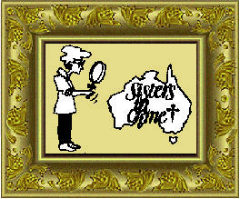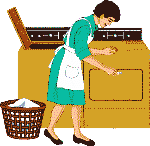


| ||
| Sisters are doing it on the Net
|
||


|
 For the St Kilda Writers' Festival in February, Sisters in Crime presented a multimedia evening about women, computers and crime fiction, our most ambitious event ever. A packed house of around a hundred and fifty heard - and saw - all about the different facets of new communication technologies from word-processing and email through to virtual reality and 'cyberspace'
For the St Kilda Writers' Festival in February, Sisters in Crime presented a multimedia evening about women, computers and crime fiction, our most ambitious event ever. A packed house of around a hundred and fifty heard - and saw - all about the different facets of new communication technologies from word-processing and email through to virtual reality and 'cyberspace'
The focus, however, was not on technical wizardry but rather its creative representation in both crime literature and film. We heard beautifully read extracts from a number of feminist crime novels dealing with computer technologies, original reports and stories from Kerry Greenwood, British crime writer Val McDermid, Cate Kennedy and Lindy Cameron and saw video extracts from VR and The Net. All of this was superbly linked by convenor Sue Turnbull. Unfortunately, space constraints prevent us from including the novel excerpts (we recommend reading the books themselves) or republishing Cate Kennedy's story, Ether, or Lindy Cameron's Feedback, a futuristic detective thriller set in cyberspace (which Lindy now plans to turn into a novel). However, we can share with you some of the highlights of the occasion.
|
| Sue Turnbull:
We will be showcasing new crime writing by Kerry Greenwood, Cate Kennedy and Lindy Cameron which embraces these technologies in various ways. We will be introducing you (if you are not already familiar) to some of terms and issues related to women and the new communication technologies. We hope to demonstrate that these should hold no fear although they provide an excellent place for the staging of that anxiety which keeps us on the edge of our chairs. We will also be offering you ocular evidence of these technologies in action in two film extracts which address the issue of women, crime and technology from a variety of perspectives - not all of which are encouraging. For every person who embraces a new technology thinking it will change human life for the better, there is someone who thinks our lives will be inevitably changed for the worse. - Sue Turnbull
|
| I want to speak briefly first in my capacity not as a crime fiction addict but as a lecturer in media and communication and to point out that every new form of communication technology brings with it both utopian and dystopian possibilities. And here I'm talking about a time span which might include the introduction of the printing press to the arrival of pay television.
For every person who embraces a new technology thinking it will change human life for the better, there is someone who thinks our lives will be inevitably changed for the worse. And as one of my colleagues in the field has remarked: "Whenever we invent a new technology, people wonder, 'How can we use this for sex?'" Now I'm not sure this is entirely true - because I've racked my brains trying to think of the erotic quotient of a microwave oven - though I can see the possibilities in an electric toothbrush! But one of the other issues at stake here - and it's a long and complex one which I'm not going to explore in detail - is the issue of who designs and then who uses the technology. For example, a British study of who uses the technology in the home found that by asking family members to place pink and blue stickers on the technology they operated (pink for the women, blue for the men), they discovered that there were quite clear gendered patterns.
|
 (A British study found that) … women had no problem programming electronic washing machines, microwaves, ovens etc (the domestic stuff) but they left the video recorder and the computer to the men … it would simply become another domestic chore …
(A British study found that) … women had no problem programming electronic washing machines, microwaves, ovens etc (the domestic stuff) but they left the video recorder and the computer to the men … it would simply become another domestic chore …
As you might expect, women had no problem programming electronic washing machines, microwaves, ovens etc (the domestic stuff) but they left the video recorder and the computer to the men in the family. In the case of the video recorder, the argument pursued by the women in the study was, if they learned to do that, it would simply become another domestic chore like all the others. But, in the case of the computer, we're dealing with different resistances, different sets of anxieties. … our goal … is to encourage women to seize control of the computer in the home and to adapt it and use it for our own purposes. - Sue Turnbull |
 Why should this be so? There are many reasons too numerous to mention here. But our goal tonight is to encourage women to seize control of the computer in the home and to adapt it and use it for our own purposes. In order to encourage that, I want now to mention briefly some of the possible functions of the computer as a form of communication technology.
Why should this be so? There are many reasons too numerous to mention here. But our goal tonight is to encourage women to seize control of the computer in the home and to adapt it and use it for our own purposes. In order to encourage that, I want now to mention briefly some of the possible functions of the computer as a form of communication technology.
|
| Apart from using it as an electronic typewriter or as a way of doing your accounts or as a games station (and there are some wonderful games available such as crime-based stories like Under a Killing Moon or our own Australian The Dame is Loaded), the computer can also be a means of communicating directly with others via what we have come to call the Internet.
There's more …
|
| Sisters montage created by Beverley Macdonald
|
|
This article produced by Sisters in Crime, Melbourne reprinted by permission Celebrate everything! www.festivale.info ISSN 1328-8008 Published in Melbourne, Victoria, Australia disclaimers | contact the editor | Festivale revision history Filed: Oct 1996 Entire site refreshed: Dec 2008-Feb 2009 | Site URL transferred: Jan 2005 (previously www.festivale.webcentral.com.au) |